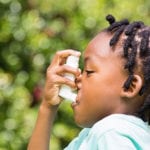Health barriers to learning (HBLs) are untreated health conditions that undermine a child's ability to succeed in school. These particular HBLs have been identified due to their prevalence, evidence of their link to learning, and availability of effective screening and treatment approaches. Left untreated or undermanaged, HBLs can adversely affect children’s ability to see, hear and pay attention in the classroom, their ability and motivation to learn, their attendance, their academic performance, and even their chances of graduating from high school1. Research shows that providing students with access to vision and dental care can result in a decrease of behavior referrals by 72% as well as students experiencing gains in English and math2. We believe that healthy children result in better students and that better students create thriving communities.
Uncontrolled Asthma
Asthma is a leading chronic illness among children and adolescents in South Carolina. It is also one of the leading causes of school absenteeism.
Vision Problems
80% of learning happens through sight, so a vision-related learning problem can greatly hinder a child’s ability to succeed at school.
Hearing Problems
Untreated hearing loss causes delays in the development of speech and language, and those delays then lead to learning problems, often resulting in poor school performance.
Dental Problems
Students with chronic dental pain are 4 times more likely to have a low grade point average.
Persistent Hunger
In South Carolina, 1 in 6 children struggles with hunger. In families facing food insecurity, children are more likely to have lower math scores and repeat a grade.
Mental Health Problems
Suicide is the #2 leading cause of death in young adults nationwide.
Behavioral Health Problems
Students with undiagnosed or untreated ADHD have persistent academic difficulties that result in lower average scores, more failed grades, more expulsions, and increased dropout rates.
Effects of Lead Exposure
Early childhood lead exposure is associated with poorer achievement on standardized reading and math tests in the third grade.
- Gracy, MD, MPH, D., Fabian, MPA, A., Roncaglione, MSc, V., Savage, MPH, K., & Redlener, MD, I. (2017, February 06). HBL Literature Review. Retrieved August 24, 2020, from https://www.childrenshealthfund.org/hbl-literature-review
- Reville, P. (n.d.). Healthy Children, Better Learning. Retrieved August 24, 2020, from https://www.gse.harvard.edu/news/uk/18/09/healthy-children-better-learning





